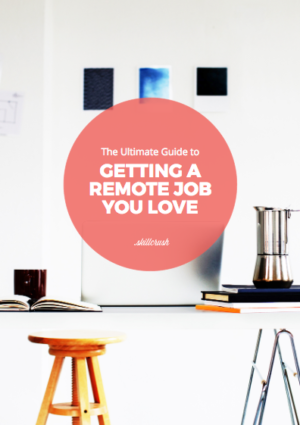
Get Our FREE Guide to Landing a Remote Job You Love
Say goodbye to the 9-to-5. Learn the steps you can take TODAY to get a remote job.
Are you ready to change careers and you even know exactly what you want, but you’re not entirely sure how to get there? Unfortunately, if your dreams of career transition feel like they’ll take years of study and a life’s savings to make a reality, it can seem just as easy to stick with the unsatisfying job you already have. But is it really that hard to put yourself in position to start a new job in a brand new industry? To get a clear sense of what it takes, I spoke to three career professionals who’ve made major, successful career changes themselves. Here’s what they had to say.
What Kind of Skills Do You Need to Start Your New Career and How Can You Get Them?
When it comes to changing careers and landing your first job in a new industry, skills are the backbone of a successful career transition. But what skills exactly, and where can you learn them? Picking up skills for a new career path often brings to mind thoughts of spending time and money going back to college for a new bachelor’s degree or master’s degree, but this doesn’t have to be the case. If you’re looking at becoming a web developer, for instance, basic skills like HTML can be learned in a matter of weeks.
Charlene Briganty, Communications and Content Marketing Manager at telecom company Intraway, advises that anytime people are interested in switching careers or refocusing their work, they need to be open to learning new skills. However, the skill-learning landscape has evolved past the one-size-fits-all model of college degrees. “I think in this day and age, you just need to be a ‘lifelong learner’ in order to succeed,” Briganty says. But that doesn’t mean job seekers need to languish for the rest of their life in a classroom. Instead, it means finding ways to reframe transferable skills you already have (see below), while gradually up skilling your existing toolkit over time—something you can do even if you’re working at a full-time job (and without racking up huge student debts).
Briganty says that in preparation for her current position she simply took a three day telecom 101 course to build up fundamental knowledge about the industry. Afterward she began immersing herself in industry publications and attending topical webinars. This was something Briganty could easily do while working. It’s also something that fit with her overall approach to skill building, which is to constantly and consistently pick up new skills and follow new trends, even when career change isn’t immediately on the horizon. Similar classes and resources in a range of topics are available online—and often free—from sites like Coursera and Udemy, making it possible for you to also become versed in industry basics enroute to a new career.
How Can You Transfer the Skills You Already Have When Starting a New Career?
In addition to learning new skills, Briganty says that—when changing careers—it’s a good idea to take stock of the skill set you already have and figure out how any of those skills might be repurposed for a new career field. Briganty points to management skills as an example: “a good manager is a good manager no matter what industry they work in.” Briganty says. The same goes for problem-solving skills, general computer skills, communication skills, and any other soft skills you’ve already developed on your current career path. You can feature these skills on your resume, and it doesn’t matter where they came from.
Shakti Sotomayor, Head of Content at gift registry site Blueprint Registry, was a chef before she became a content marketer, but she was able to directly transfer a number of skills from her previous career to her new one. Sotomayor credits the general workplace qualities she developed during her chef days as a direct vehicle for learning the job-specific skills she needed for digital marketing. “I had to learn new marketing languages, software programs, and effective inbound marketing strategies all very quickly,” Sotomayor says. “I feel that my discipline as a chef helped me be successful learning these skills.” Remember, no matter how counterintuitive it might feel or how disconnected your current job seems from the career field you’re trying to enter, you probably have more skills than you think that can be presented on a resume to help illustrate your experience and your ability to navigate a successful career transition.
How Do You Explain Your Career Change to Potential Employers?
Even though the path from your current career to the career field you’re trying to enter might make sense to you, it might not be as clear to potential employers.
Ellen Reda, Director of Operations and Talent Acquisition at creative staffing agency Artisan Talent, says that she often helps people with this specific problem in her current role. According to Reda, it’s less important to explain why you are changing careers (though she adds that you do need to address your motivations) and more important to explain how your existing skill set relates to this new industry (again, transferring your existing skills is huge). “I find people need to explain three things,” Reda says. “Their passion for the new career path, proof that they’ve done their due diligence in understanding this new career, and how their transferable skills plus any new skills they have learned or are working on will relate to this new job.” Reda says this has been true during her own career changes and she’s found success covering these topics in her cover letter, her resume summary, and again during interviews. “Hiring managers often struggle with understanding how past skills relate to a new career,” Reda says, so it’s important for you to help them understand.”
Sotomayor says that, in her experience, summarizing her overall career journey during the interview process is always beneficial. Sotomayor says the question about how her past experience is relevant to her current career often comes up during interviews and she welcomes the chance to address is face-to-face. “My career path has been based on finding the best way to use all my skills and talents in one place, while also being able to make a living from them,” Sotomayor says. When she’s able to explain this to potential employers, her story starts to make a lot more sense to them.
How to Get Your Foot in The Door While Also Not Starting From the Bottom
When you already have career experience and you’re trying to transition to a new career path, you have two main objectives in mind—one is simply to get your foot in the door of your new industry, but—as someone with career history—it’s also nice not to have to start all the way back at the bottom. So how can you pull both of these off?
For Reda, getting her foot in the door in a new industry was a matter of aiming for a job that was to where she wanted to be in that field but at a slightly junior level, since being willing to start at a slightly lower level can make up for some of your deficit in job-specific experience. But does that mean starting all the way from the bottom? Reda says it depends on how different your new career is from your previous career—the more you’re able to make the case for those transferable skills, the more the conversation will shift from what you lack, experience-wise, to the value you bring to an organization. However, If your new career is so removed from what you were doing previously that you do find yourself starting from square one, Reda says not to panic. “Even if you start at the bottom, I’ve found that career changers move up quickly because they already understand the basics of work and they have a passion for their new field that sets them apart from other candidates.”
Finally, when it comes to getting in the door at a level you’re happy with, never underestimate the value of networking. Landing a job through connections isn’t an exact science, but it can provide an easier path to opportunities in the right circumstances. As you up skill and prepare for your transition, take advantage of resources like Meetup.com and start looking for networking opportunities in your area.
Remember—career change is possible, the skills you’ll need are often easier to come by than you might think, and you’re probably already a long way toward your career change goals with the skills you already have.

Get Our FREE Guide to Landing a Remote Job You Love
Say goodbye to the 9-to-5. Learn the steps you can take TODAY to get a remote job.

